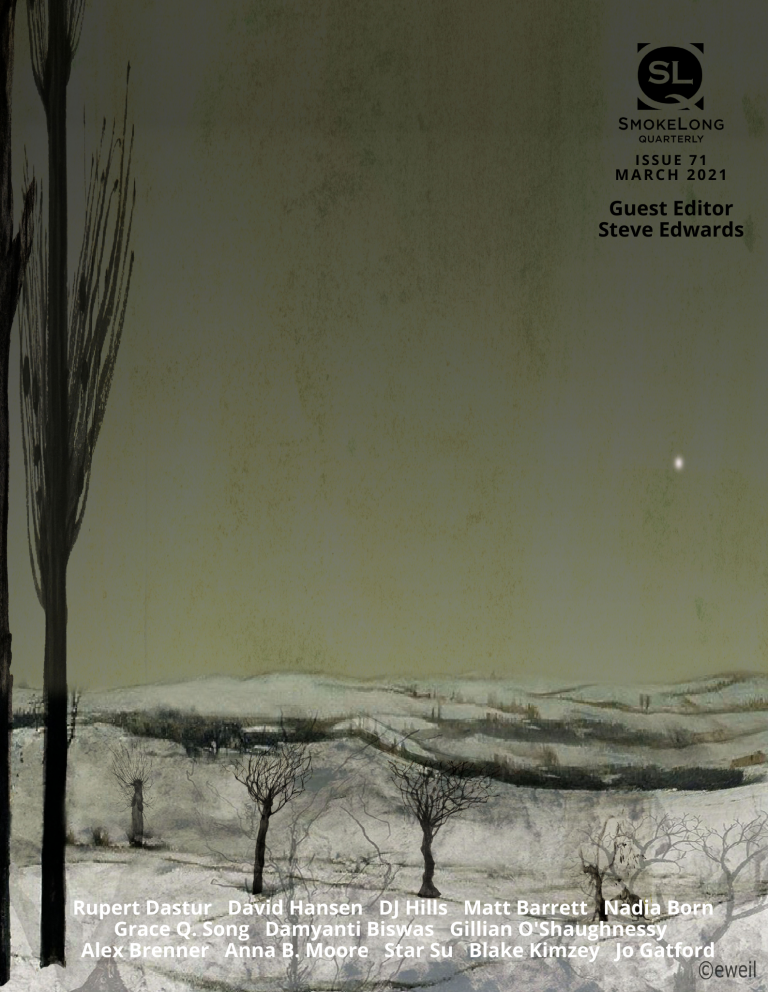I love that “Onion Heart” is written in present tense. It helps reverberate the universal aspects of love and loss through the story of one’s life. Was writing it challenging? Emotional? Nerve-racking?
Thank you for taking the time to read it and for these excellent questions. And huge thanks to SmokeLong Quarterly for publishing the work. It’s a real honor.
I like the immediacy of the present tense, but as with most choices, it was dictated by the needs of the plot and characters.
Editing is challenging. Trying to make sure the right words are used in the right order takes a hell of a long time.
Emotional? In a first draft that’s what I’m always mining for, but I find editing often needs a dispassionate eye.
Nerve-racking? I prefer the word hopeful. I hope I’ve done the characters justice and I hope readers enjoy it.
You have trivia such as the teaspoon in mouth while chopping onions or the first lipstick commercial like in Harper’s Magazine or the Smithsonian. While writing this piece, how did you see these tidbits of information fall together in relation to the narrator or Brian or Rhys?
I’m interested in stream-of-consciousness and the way the mind works through association; I was trying to capture this, while revealing the character’s emotional state. Structurally, these details slow down the plot and should add to the tension.
The layers of an onion are much like the layers of ourselves and who we are as individuals. Does the onion heart in the story portray a hunger or a yearning to listen to our own hearts, or our true selves despite the layers, despite the crying mess we may become chopping onions?
I prefer to leave interpretation to readers. I’m just here happily putting words down on the page.
On a side note, I’m always pretty humbled by onions—it’s amazing that something so simple and commonplace can remind us how little control we have over our bodies. There you are, chopping away, and the next minute your eyes are leaking. Stories are a bit like onions. Lines and layers of words making something greater than the individual parts. They taste great, too. Three cheers to the onion!
Things like the Welsh Love Spoon remain in our lives and are very much reminiscent of the people who we associate with those things. Rhys comes back in the narrator’s memory through the spoon. What do you think is the role of writers in capturing the essence of life in nonessential or forgettable things that perhaps have once been very special?
I’m not too certain what the essence of life is or if we can suggest what writers should or shouldn’t be doing and what their roles may or may not be. I’m just one person happily tapping away at the computer, so I can only speak for myself, rather than for writers generally. First and foremost, I see writing (specifically, fiction writing) as entertainment. I mean that in the very broadest sense. I’m a bit wary of rules, but this one strikes me as pretty integral to the storyteller: Don’t be boring. The advertising titan, Ogilvy, said reading is a choice and if your text is dull, your readers will choose to do something else. Simple as that. As for all the other stuff, well, it’s great if you can add the side-dishes and the seasoning and if there’s pudding with custard, sure. Who doesn’t like custard?
“There are things you can hide, things you can’t”—this is such a remarkable line. What does it tell you about your creative imagination or the people you choose to characterize in your writing?
That’s kind, thank you. Honestly, I’m not too sure what it says about my creative imagination.
I’ve used this sentence structure in a number of pieces because I think it captures the way our lives are perpetually swinging between binaries (being/not being; saying/not saying; doing/not doing) that affect our present and compound far into the future. I suppose it’s inevitable my characters will reflect ideas I think about, although I’m really just trying to get to the emotional center of who they are. Sometimes I feel like I dig far enough and if readers feel that and enjoy the writing, then I’m happy.



 The core workshop of SmokeLong Fitness is all in writing, so you can take part from anywhere at anytime. We are excited about creating a supportive, consistent and structured environment for flash writers to work on their craft in a community. We are thrilled and proud to say that our workshop participants have won, placed, or been listed in every major flash competition. Community works.
The core workshop of SmokeLong Fitness is all in writing, so you can take part from anywhere at anytime. We are excited about creating a supportive, consistent and structured environment for flash writers to work on their craft in a community. We are thrilled and proud to say that our workshop participants have won, placed, or been listed in every major flash competition. Community works.